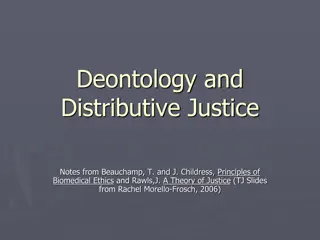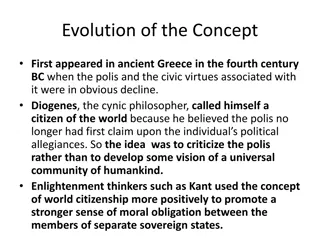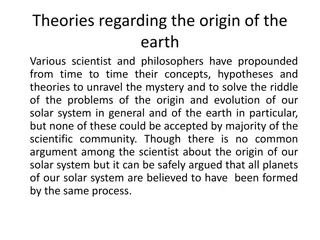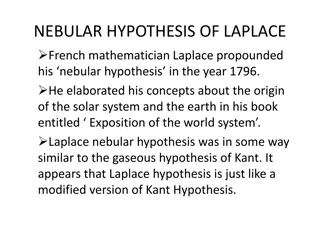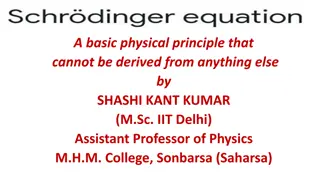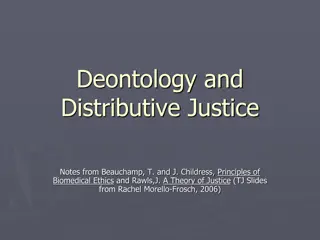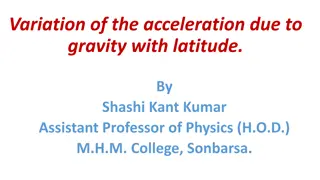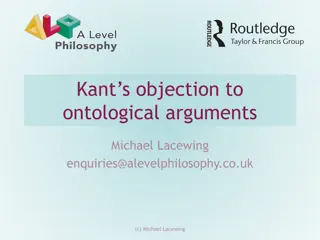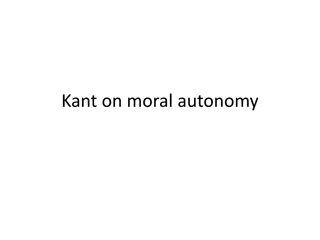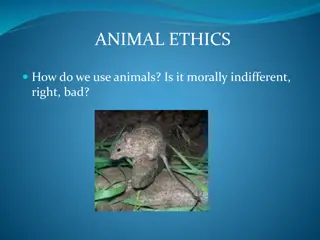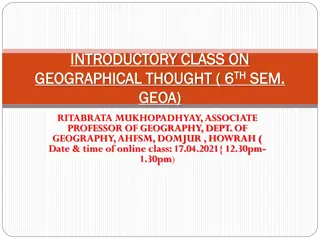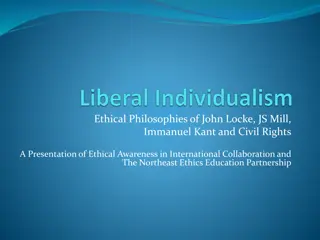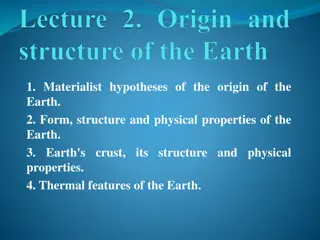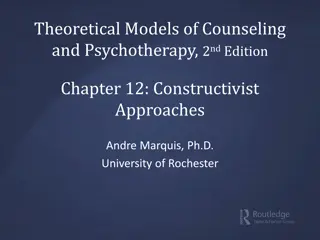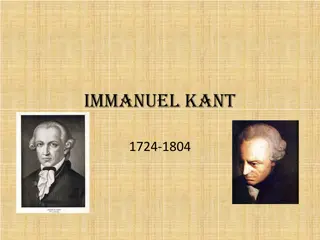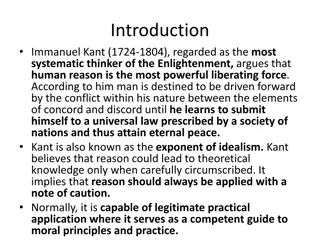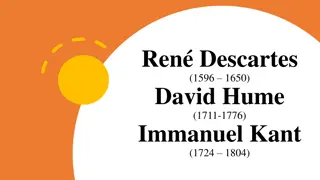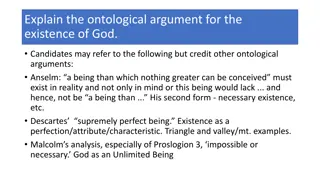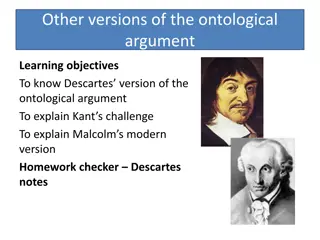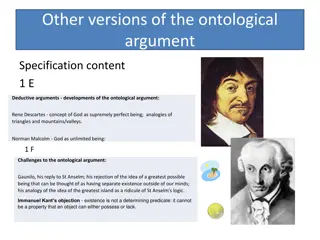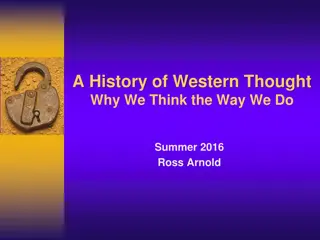CYGNUS VALUENET Business Plan
Learn about the income opportunities, bonuses, and rewards offered in the CYGNUS VALUENET Business Plan by Kamal Kant Vashisth, Ph.D. The plan includes various types of income such as Retail Profit, Jump Start Bonus, Performance Bonus, Leadership Bonus, and more. Participants can earn rewards like T
1 views • 10 slides
Understanding Nebulae: From Kant's Proposal to Hubble's Discoveries
In 1755, Kant proposed that nebulae are island universes, sparking a debate on their nature within or outside our galaxy. Shapley and Curtis debated whether spiral nebulae were rotating systems like our Milky Way. Hubble's observations of the Andromeda Nebula led to the realization that it is a gala
10 views • 166 slides
Understanding Deontology and Distributive Justice in Ethics
Deontology, originating from the Greek words for duty and study of, focuses on morally required, forbidden, or permitted choices. It emphasizes obedience to duty and opposes utilitarianism, prioritizing what is morally right over the overall good. Unlike virtue theories, deontology assesses moral ob
2 views • 32 slides
Evolution of Cosmopolitan Citizenship: From Ancient Greece to Modern Critiques
The concept of cosmopolitan citizenship has evolved from ancient Greece to modern times, with thinkers like Kant and global social movements reshaping its meaning. While some advocate for a universal sense of responsibility, critics question the feasibility and potential dangers of such projects. Mi
2 views • 14 slides
Theories on the Origin of Earth and Solar System
Scientists and philosophers have proposed various theories regarding the origin of Earth and our solar system, with concepts ranging from evolutionary to catastrophic. The Dust gas cloud theory, Planetesimal hypothesis, Binary star hypothesis, and more have been suggested to explain how planets were
4 views • 7 slides
Laplace's Nebular Hypothesis: Origin of the Solar System
French mathematician Laplace proposed the nebular hypothesis in 1796, refining Kant's gaseous hypothesis. Laplace asserted a hot rotating gaseous nebula cooled gradually, contracting and increasing rotation speed. Eventually, centrifugal forces led to the formation of ring structures, contrasting wi
0 views • 6 slides
Fundamental Physics Principles Explored by Schrodinger and De Broglie
Shashi Kant Kumar dives into the groundwork laid by notable physicists such as Schrodinger and De Broglie, highlighting the fundamental principles of quantum mechanics. The evolution of Schrodinger's equation, the Nobel Prize-winning collaborations, and the application of wave mechanics to atomic st
0 views • 13 slides
Deontology and Distributive Justice in Ethics
Deontology, rooted in the concept of duty, focuses on morally required, forbidden, or permitted choices. It emphasizes obedience to duty, opposing utilitarian claims. Unlike virtue theories, deontology prioritizes what is right over an overall conception of good. Immanuel Kant's categorical imperati
0 views • 32 slides
An Examination of Ontological Arguments for God's Necessary Existence
Various ontological arguments, such as Malcolm's and Anselm's, propose that the existence of God is logically necessary, grounded in the concept of God as the greatest possible being. These arguments challenge the coherence of the concept of God and counter objections, like Kant's claim that existen
2 views • 10 slides
Variation of the Acceleration Due to Gravity with Latitude
Explore the variations in acceleration due to gravity with latitude through insightful images created by Shashi Kant Kumar, Assistant Professor of Physics at M.H.M. College, Sonbarsa. The images visually depict how gravitational acceleration changes with different latitudes, providing valuable insig
0 views • 11 slides
Kant's Critique of Ontological Arguments
An exploration of Kant's objection to ontological arguments, examining the flaws in the reasoning of Anselm and Descartes. Kant argues that existence is not a predicate and does not enhance the concept of a being. Therefore, ontological arguments cannot prove the existence of God solely through conc
0 views • 7 slides
Kant on Moral Autonomy: Insights on Duty and Inclination
Immanuel Kant emphasizes the significance of moral freedom and autonomy, highlighting the superiority of acting out of duty over mere inclination. He asserts that a good will is inherently valuable, irrespective of consequences or external motivations. Kant distinguishes between actions driven by du
0 views • 21 slides
Understanding Animal Ethics: Perspectives and Philosophies
Exploring the complexities of animal ethics, this content delves into various viewpoints on how we should treat animals, ranging from Stoic and Christian ethics to Immanuel Kant's moral autonomy and utilitarianism. Discussions on moral considerations, duties towards animals, and the importance of co
0 views • 37 slides
Introduction to Geographical Thought: Key Concepts and Major Schools
Geographical thought explores the description and interpretation of Earth's phenomena, addressing fundamental questions of geography. It involves concepts such as Earth surface, spatial distribution, areal differentiation, and more. It also delves into the relations with other sciences and social sc
0 views • 21 slides
Ethical Philosophies of John Locke, JS Mill, Immanuel Kant, and Civil Rights
This presentation explores the ethical philosophies of John Locke, JS Mill, and Immanuel Kant, focusing on individual rights, moral autonomy, and the principles of classical liberalism. It discusses the influence of these philosophers on research ethics, emphasizing the protection of individual huma
0 views • 48 slides
Reexamining the Biological Race Debate by Quayshawn Spencer
Quayshawn Spencer reexamines the biological race debate, discussing the onto-semantic strategy, its problems, and applications to public health genomics. The philosophical foundations of biological racial anti-realism are critiqued, exploring the concept of race through historical perspectives like
0 views • 37 slides
Hypotheses on the Origin of Earth and Earth's Formation
Various materialist hypotheses proposed by scientists such as Kant, Laplace, Schmidt, and Fesenkov regarding the origin of Earth and the solar system. These hypotheses suggest different processes, including the formation from primary dusty matter, hot nebula, interstellar meteorite dust, and gas-dus
0 views • 16 slides
Explore the Rich History of Samarkand
Samarkand, known for its ancient roots and diverse cultural influences, holds a special place as a city unscathed by severe summer conditions. The name derives from Semer meaning city and kant meaning settlement. Founded by Persian and Turkish rulers, Samarkand's legacy includes being a strategic ou
0 views • 29 slides
Constructivist Approaches in Counseling and Psychotherapy: A Philosophical Perspective
Constructivist approaches in counseling and psychotherapy emphasize the ongoing process of structuring experiences to create meaning. This perspective involves philosophical underpinnings from thinkers such as the Buddha, Immanuel Kant, and Jean Piaget, highlighting the role of individual constructi
0 views • 35 slides
Exploring the Philosophy of Immanuel Kant
Delve into the profound philosophical works of Immanuel Kant, focusing on Kantian epistemology, the nature of judgments, synthetic a priori judgments, enlightenment, morality through the Categorical Imperative, and political theories advocating for perpetual peace. Kant's ideas challenge traditional
0 views • 8 slides
Kant's Moral Philosophy: Reason, Freedom, and the State
Immanuel Kant, a prominent Enlightenment thinker, emphasizes the liberating power of human reason in guiding individuals towards moral principles and practices. Kant's moral philosophy centers on treating each person as an end-in-itself, driven by the good will informed by reason. His concept of mor
0 views • 14 slides
12 New Projects Approved Under Industrial Corridor Project with an Estimated
The development, monitored by notable current and ex-IAS officers, such as Ramesh Abhishek and Amitabh Kant aims to transform several regions into \u201cSmart Cities\u201d equipped with next-generation infrastructure and boost manufacturing capabilities to enhance global competitiveness.
0 views • 7 slides
A Dive into Philosophical Thought: Descartes, Hume, Kant, and More
Explore the intellectual landscape of renowned philosophers like René Descartes, David Hume, Immanuel Kant, and other influential figures such as Nicolaus Copernicus and Martin Luther. Delve into Descartes' meditations on doubt, the nature of the human mind, and the example of wax, reflecting on fo
0 views • 34 slides
Ontological Argument for God's Existence and Challenges
The ontological argument posits that a being than which nothing greater can be conceived must exist in reality, not just in the mind. Critics challenge this argument, citing issues with defining God and debating whether existence can be a characteristic. Gaunilo and Kant present criticisms focusing
0 views • 30 slides
Exploring Different Versions of the Ontological Argument
This content delves into various versions of the ontological argument, including Descartes' and Kant's perspectives. Descartes sought to prove God's existence through reason alone, emphasizing the innate conception of a supremely perfect being. The challenges posed by Kant and Malcolm to this argume
0 views • 24 slides
Exploring Various Versions of the Ontological Argument
This content delves into different versions of the ontological argument, including developments by philosophers like Rene Descartes and challenges posed by Gaunilo and Immanuel Kant. An exploration of the concept of God as a supremely perfect being is presented, along with key arguments and objectio
0 views • 27 slides
Evolution of Western Philosophical Thought: From Idealism to Humanism
Explore the rich history of Western philosophical thought from the idealism of Plato to the humanism of Whitehead. Trace the progression of thought, including materialism, rationalism, skepticism, and relativism, as key thinkers like Descartes, Kant, Marx, and others shaped our understanding of real
0 views • 16 slides


